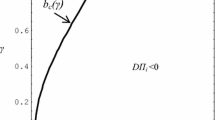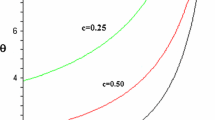Abstract
It is believed that cooperation between the final goods producers hurts consumers and reduces social welfare but increases profits. We show that these results may not hold in the presence of a unionized labor market. The effects of product market cooperation on consumers, profits and social welfare may depend on the union’s disagreement utility, its bargaining power and the degree of product market cooperation.









Similar content being viewed by others
Notes
An important factor that differentiates national unionization structures is the degree of wage setting centralization (Flanagan 1999 and Wallerstein 1999). An industry-wide wage setting is more relevant in Germany and Scandinavia, while firm-specific wage setting is more relevant in Japan and North America. Iversen (1998) shows an index of centralization of wage bargaining in different countries.
The “efficient bargaining” model, which stipulates that the firms and unions bargain over wages and employment, is an alternative to the right-to-manage model. See, Layard et al. (1991) for arguments in favor of right-to-manage models.
We ignore the case of λ = 1 to avoid indeterminacy in our maximization problem, since, in this situation, the firms may prefer to shutdown one plant. The case of λ = 1 should be considered separately.
If α = 1, the equilibrium wages are independent of λ.
We use ‘The Mathematica 4’ (see Wolfram 1999) for the figures of this paper.
If α = 1, the equilibrium wages are independent of λ.
References
Brod A, Shivakumar R (1999) Advantageous semi-collusion. J Ind Econ, 47, pp 221–230
Calabuig V, Gonzalez-Maestre M (2002) Union structure and the incentives for innovation. Eur J Polit Econ 18:177–192
Davidson C (1988) Multiunit bargaining in oligopolistic industries. J Lab Econ 6:397–422
Dhillon A, Petrakis E (2002) A generalised wage rigidity result. Int J Ind Organ 20:285–311
Farrell J, Shapiro C (1990) Horizontal mergers: an equilibrium analysis. Am Econ Rev 80:107–126
Fershtman C, Gandal N (1994) Disadvantageous semicollusion. Int J Ind Organ 12:141–154
Flanagan RJ (1999) Macroeconomic performance and collective bargaining: an international perspective. J Econ Lit 37:1150–1175
Horn H, Wolinsky A (1988) Bilateral monopolies and incentives for merger. Rand J Econ 19:408–419
Iversen T (1998) Wage bargaining, central bank independence and the real effects of money. Int Organ 52:469–504
Layard R, Nickell S, Jackman R (1991) Unemployment, macroeconomic performance and the labour market. Oxford University Press, Oxford
López MC, Naylor RA (2004) The Cournot-Bertrand profit differential: a reversal result in a differentiated duopoly with wage bargaining. Eur Econ Rev 48:681–696
Mukherjee A (2008) Unionised labour market and strategic production decision of a multinational. Econ J 118:1621–1639
Symeonidis G (2008) Downstream competition, bargaining and welfare. J Econ Manage Strategy 17:247–270
Wallerstein M (1999) Wage-setting institutions and pay inequality in advanced industrial societies. Am J Polit Sci 43:649–680
Wolfram S (1999) The mathematica book, 4th edn. Cambridge University Press, Wolfram Media
Acknowledgement
I thank an anonymous referee for helpful comments and suggestions. The usual disclaimer applies.
Author information
Authors and Affiliations
Corresponding author
Rights and permissions
About this article
Cite this article
Mukherjee, A. Product Market Cooperation, Profits and Welfare in the Presence of Labor Union. J Ind Compet Trade 10, 151–160 (2010). https://doi.org/10.1007/s10842-009-0063-4
Received:
Revised:
Accepted:
Published:
Issue Date:
DOI: https://doi.org/10.1007/s10842-009-0063-4




